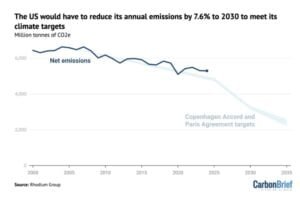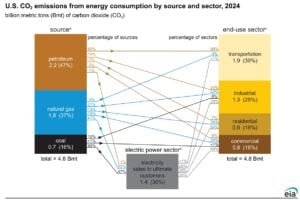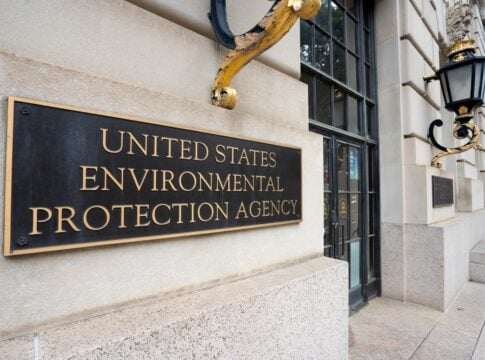The U.S. Environmental Protection Agency (EPA) has proposed a sweeping rollback of key emissions rules for fossil fuel power plants. On March 12, 2025, EPA Administrator Lee Zeldin announced plans to repeal Biden-era regulations aimed at cutting greenhouse gas emissions, including the updated Clean Power Plan and stricter Mercury and Air Toxics Standards (MATS).
This move aligns with President Trump’s energy agenda and is framed as part of the “Power the Great American Comeback” campaign. According to the EPA, the rollback could save the power sector $19 billion over two decades, or roughly $1.2 billion per year, starting in 2026.
Trump-Era EPA Move Targets Biden’s Climate Rules: Will the Climate Impact Be Severe?
EPA Administrator Zeldin highlighted,
“Affordable, reliable electricity is key to the American dream and a natural byproduct of national energy dominance. According to many, the primary purpose of these Biden-Harris administration regulations was to destroy industries that didn’t align with their narrow-minded climate change zealotry. Together, these rules have been criticized as being designed to regulate coal, oil and gas out of existence.”
The 2024 Clean Power Plan 2.0, finalized under the Biden administration, was expected to cut 1.38 billion metric tons of carbon dioxide by 2047. That’s equivalent to taking over 320 million gasoline-powered cars off the road for a year.
- The U.S. is the world’s second-largest emitter and has the highest per-capita emissions. That puts a big responsibility on the country to lead climate action.
But hitting the 2030 climate goal won’t be easy. The Rhodium Group says emissions must fall by 7.6% every year from 2025 to 2030. And undoubtedly, that’s a steep drop.

By revoking this plan, the U.S. risks losing one of its most ambitious tools for slashing power sector emissions. The plan also targeted other air pollutants known to harm human health, including fine particulates and heavy metals like mercury and arsenic.
EPA Seeks End to CO₂ Limits for Power Plants
The EPA’s proposal includes eliminating all greenhouse gas standards under Section 111 of the Clean Air Act for both new and existing fossil fuel plants. The agency argues that CO₂ emissions from power plants do not significantly contribute to “dangerous air pollution” as defined under the Act. Therefore, they say these emissions shouldn’t be regulated in this way.
The proposal would also reverse a 2024 rule requiring carbon capture and storage (CCS) technology on new natural gas and modified coal plants. Instead, the EPA is considering less strict efficiency-based rules for new gas plants.

Repeal of Mercury and Air Toxics Standards (MATS) Amendments
Alongside the carbon rules, the EPA wants to eliminate amendments made in 2024 to the Mercury and Air Toxics Standards. These changes had tightened mercury and particulate matter limits for coal- and oil-fired plants. The rollback would revert the standards to their 2012 levels.
The agency estimates this repeal could save the power industry another $1.2 billion over ten years beginning in 2028. However, environmental groups argue that the 2024 MATS updates were necessary to protect communities, especially in states like West Virginia, Texas, and North Carolina, where coal power remains a key energy source.
- ALSO READ: Trump’s New Tariffs Wipe Out $2.5 Trillion: How Can It Stall America’s Clean Energy Future?
Cites Supreme Court Ruling in Justification
The EPA is leaning on the 2022 Supreme Court decision in West Virginia v. EPA, which limited the agency’s authority to reshape the U.S. energy mix under the “major questions doctrine.” Critics of the Biden administration’s rule say it tried to revive the original Clean Power Plan, which had been blocked by the courts years earlier.
It now argues that regulating power plant CO₂ emissions exceeds its authority and shifts energy decisions away from states and consumers.
Energy Security vs. Climate Commitments
The rollback is being pitched as an effort to lower energy costs, boost national security, and strengthen U.S. manufacturing. Supporters say it removes red tape for coal and gas plants that supply reliable baseload power, especially important for sectors like AI, data centers, and heavy industry.
But critics argue that the proposed changes put the U.S. at odds with its international climate commitments. The Biden administration had pledged to reach net-zero emissions by 2050, and cutting power plant emissions is a key part of that roadmap.
What’s Next for U.S. Climate Policy?
The proposed repeals are subject to public comment before being finalized. However, the EPA’s new direction signals a dramatic shift away from federal climate regulation—one that could reshape everything from clean energy incentives to carbon trading strategies.
For now, the message from the EPA is clear: the focus is shifting from emissions cuts to energy affordability and independence. But at what cost? The answer may lie in future carbon market trends, climate data, and the response from U.S. states and industries.
The post EPA Pushes Rollback on Carbon Rules for Fossil Fuel Plants — Is U.S. Net Zero Target at Stake? appeared first on Carbon Credits.















